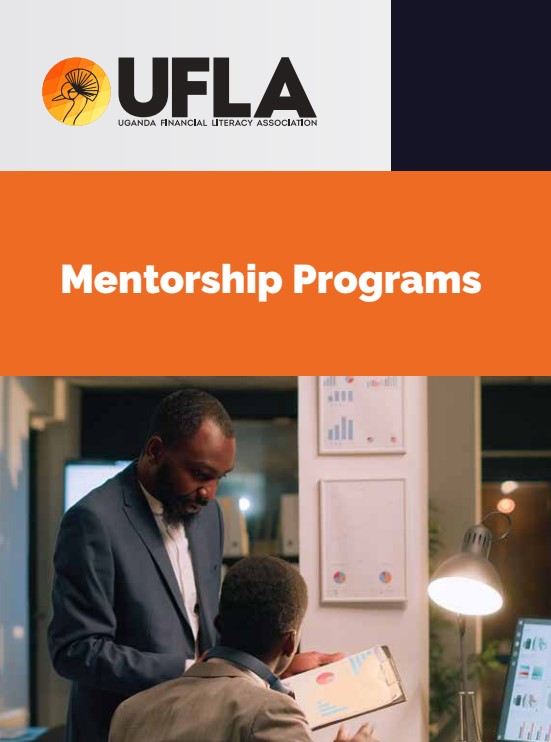Brochures
Monitoring and Evaluation
All mentorship programs will include:
- Baseline and post-program surveys
- Case studies and participant feedback
- Usage tracking on UGFINLIT App
- Peer mentorship activity reports
Mentorship Programs Overview
UFLA is preparing to roll out a comprehensive suite of Financial Literacy Mentorship Programs targeting various segments of the Ugandan population. These programs are designed to enhance financial inclusion, improve financial behaviour, and empower communities through knowledge-sharing and peer-based learning.
This program will foster open financial dialogue within households and promote intergenerational mentorship. It will equip families with practical financial tools, encourage joint goal setting, and strengthen family-based saving and budgeting practices. Components will include family workshops, mentorship circles, digital literacy training, and communication skill building to resolve financial disputes.
Aimed at Uganda’s predominantly youthful population, this program will mentor youth in personal finance, entrepreneurship, and leadership. Youth will form peer-led mentorship circles and receive support in business planning, investment, and accessing financial services. The program will leverage UFLA’s UGFINLIT App for continuous engagement.
This initiative will build a collaborative community of women trainers and professionals within UFLA. Through structured mentorship circles, monthly topic discussions, and leadership opportunities, women will enhance their financial skills and advocate for financial literacy within their communities.
This program will create peer mentorship groups for men, addressing unique financial pressures and encouraging leadership, business growth, and responsible financial behaviour. Sessions will focus on savings, debt management, family finance, and entrepreneurship.
UFLA will support political leaders with financial literacy training, public finance education, and ethical leadership development. The program will focus on personal financial management, campaign finance, and transparent public fund handling.
Public servants will receive specialized training on income planning, debt management, pension optimization, and investment. Peer mentorship groups will support ongoing learning, while digital tools will aid in managing finances and planning for retirement.
This inclusive initiative will provide accessible financial education to persons with disabilities (PWDs). It will offer Braille, sign language, and assistive formats, and pair participants with successful PWD mentors. It will also link them to financial tools, SACCOs, and entrepreneurial support.
This training initiative will strengthen the governance, sustainability, and financial operations of SACCOs and cooperatives. It will target leaders, managers, and members with tailored content on record-keeping, savings mobilization, and digital finance.
Designed for Uganda’s refugee communities, this program will provide foundational financial education, entrepreneurship mentorship, and access to both formal and informal financial services. It will promote financial self-reliance, business startup skills, and peer mentorship networks.
This elite program will prepare senior executives and top decision-makers for better corporate financial stewardship. Participants will explore topics like strategic investment planning, corporate governance, risk management, and executive wealth preservation. High-level peer exchange forums and one-on-one advisory sessions will be included.
Targeting emerging leaders and new managers, this program will focus on transitioning from personal to professional financial accountability. Topics will include salary planning, saving for long-term goals, understanding employee financial benefits, and basic investment. It will also promote budgeting and personal finance responsibility within team leadership roles.
